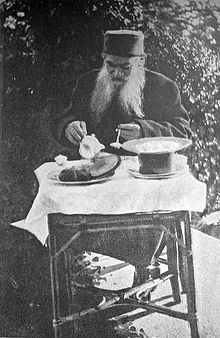Anarcho-pacifism, also referred to as anarchist pacifism and pacifist anarchism, is an anarchist school of thought that advocates for the use of peaceful, non-violent forms of resistance in the struggle for social change. Anarcho-pacifism rejects the principle of violence which is seen as a form of power and therefore as contradictory to key anarchist ideals such as the rejection of hierarchy and dominance. Many anarcho-pacifists are also Christian anarchists, who reject war and the use of violence.

The Tolstoyan movement is a social movement based on the philosophical and religious views of Russian novelist Leo Tolstoy (1828–1910). Tolstoy's views were formed by rigorous study of the ministry of Jesus, particularly the Sermon on the Mount.

Henry Shakespear Stephens Salt was a British writer and campaigner for social reform in the fields of prisons, schools, economic institutions, and the treatment of animals. He was a noted ethical vegetarian, anti-vivisectionist, socialist, and pacifist, and was well known as a literary critic, biographer, classical scholar and naturalist. It was Salt who first introduced Mohandas Gandhi to the influential works of Henry David Thoreau, and influenced Gandhi's study of vegetarianism. Salt is considered, by some, to be the "father of animal rights", having been one of the first writers to argue explicitly in favour of animal rights, rather than just improvements to animal welfare, in his Animals' Rights: Considered in Relation to Social Progress (1892).

Aylmer Maude and Louise Maude (1855–1939) were English translators of Leo Tolstoy's works, and Aylmer Maude also wrote his friend Tolstoy's biography, The Life of Tolstoy. After living many years in Russia the Maudes spent the rest of their lives in England translating Tolstoy's writing and promoting public interest in his work. Aylmer Maude was also involved in a number of early 20th century progressive and idealistic causes.

The earliest records of vegetarianism as a concept and practice amongst a significant number of people are from ancient India, especially among the Hindus and Jains. Later records indicate that small groups within the ancient Greek civilizations in southern Italy and Greece also adopted some dietary habits similar to vegetarianism. In both instances, the diet was closely connected with the idea of nonviolence toward animals, and was promoted by religious groups and philosophers.

Maud Russell Lorraine Freshel was an American socialite, designer, and animal rights and vegetarianism activist. She also went by her initials, M. R. L., which she later spelled Emarel.
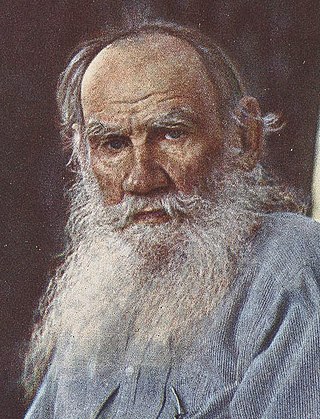
Count Lev Nikolayevich Tolstoy, usually referred to in English as Leo Tolstoy, was a Russian writer. He is regarded as one of the greatest and most influential authors of all time. He received nominations for the Nobel Prize in Literature every year from 1902 to 1906 and for the Nobel Peace Prize in 1901, 1902, and 1909.

The Brotherhood Church is a Christian anarchist and pacifist community. An intentional community with Quaker origins has been located at Stapleton, near Pontefract, Yorkshire, since 1921.
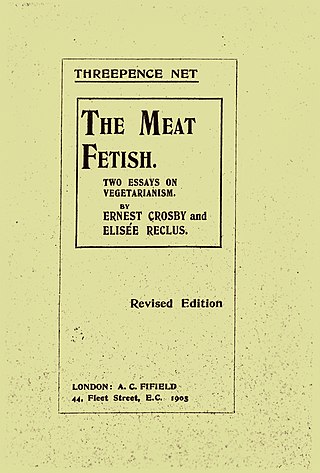
"The Meat Fetish" is a 1904 essay by Ernest Crosby on vegetarianism and animal rights. It was subsequently published as a pamphlet the following year, with an additional essay by Élisée Reclus, entitled The Meat Fetish: Two Essays on Vegetarianism.
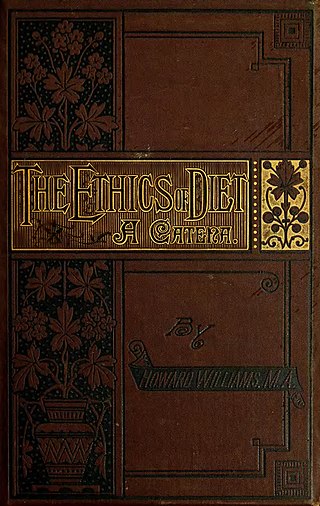
The Ethics of Diet: A Catena of Authorities Deprecatory of the Practice of Flesh-eating is an 1883 book by Howard Williams, on the history of vegetarianism. The book was influential on the development of the Victorian vegetarian movement.
"Evil Allures, But Good Endures" is a short story by Leo Tolstoy written in 1885. It is commonly included in the massively-reproduced collection Twenty-three Tales.
"Walk in the Light While There is Light" is a short story by Leo Tolstoy written in 1893. According to famed Tolstoy-translators Louise Maude and Aylmer Maude, this story reflects Tolstoy's interest with early Christians, and according to translator Huntington Smith, this is a story about the early times of Christianity.
"The Coffee-House of Surat" is a short story by Leo Tolstoy written in 1891, first published in Russian in 1893, and first published in English in 1901. Like several other of Tolstoy's works, this work is based on a French piece translated by Tolstoy himself, by Jacques-Henri Bernardin de Saint-Pierre. Due to the censorship in Russia, Tolstoy had to adjust the tale somewhat.
"Posthumous Notes of the Hermit Fëdor Kuzmich" is a short story by Leo Tolstoy written in December, 1905, and then only published in 1912, over the ferocious objections of the tsarist censors and two years after Tolstoy's death. It was never completed.
"The Godson" is a short story by Leo Tolstoy published in 1886. Inessa Medzhibovskaya, professor of English at New School for Social Research, describes the short story as the tale of a godson who is forbidden to open a certain sealed room in his godfather's palace, but then opens it and is banished, leading to his need for redemption.
"The Empty Drum: A Russian Folk Tale Retold by Leo Tolstoy" is a short story by Leo Tolstoy published in 1891. According to Aylmer Maude, famous Tolstoy translator, it was originally written in 1887, and is based on a folk story that reflects the Russian peasant's deep hatred of military service. It is based specifically on a folktale from the Volga region.
"Esarhaddon, King of Assyria" is a short story by Leo Tolstoy written in 1903. Tolstoy wrote it as part of an anthology dedicated to the victims of the Kishinev pogrom in Russia, with all of the proceeds going to a relief fund. It is the story of a king who oppresses his subjects.
Twenty-Three Tales is a popular compilation of short stories by Leo Tolstoy. According to its publisher, Oxford University Press, the collection is about contemporary classes in Russia during Tolstoy's time, written in a brief, morality-tale style. It was translated into English by Louise Maude and Aylmer Maude.
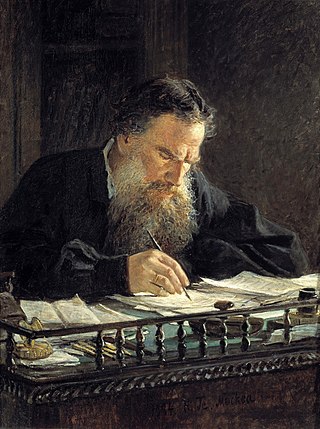
"A Letter to the Liberals" is an 1896 open letter by Leo Tolstoy denouncing not just Liberals, but all political factions that strive to exert political power over the masses. It is directed to Alexandra Kalmykov (1849-1926), a pedagogue who supported the aristocracy. The closing of a national literacy committee was the inspiration that brought Tolstoy to write it and it was written in an atmosphere where the Nihilist movement and the anti-aristocratic agitation was in full swing.

"Thou Shalt Not Kill" is an article by Leo Tolstoy. Written in 1890, it was immediately censored by the Russian censors, and was finally published on August 8, 1900. It is about how rulers, kings, and presidents are murderers for ordering armies to commit murder, and how the assassinations of such rulers should come as no surprise.
